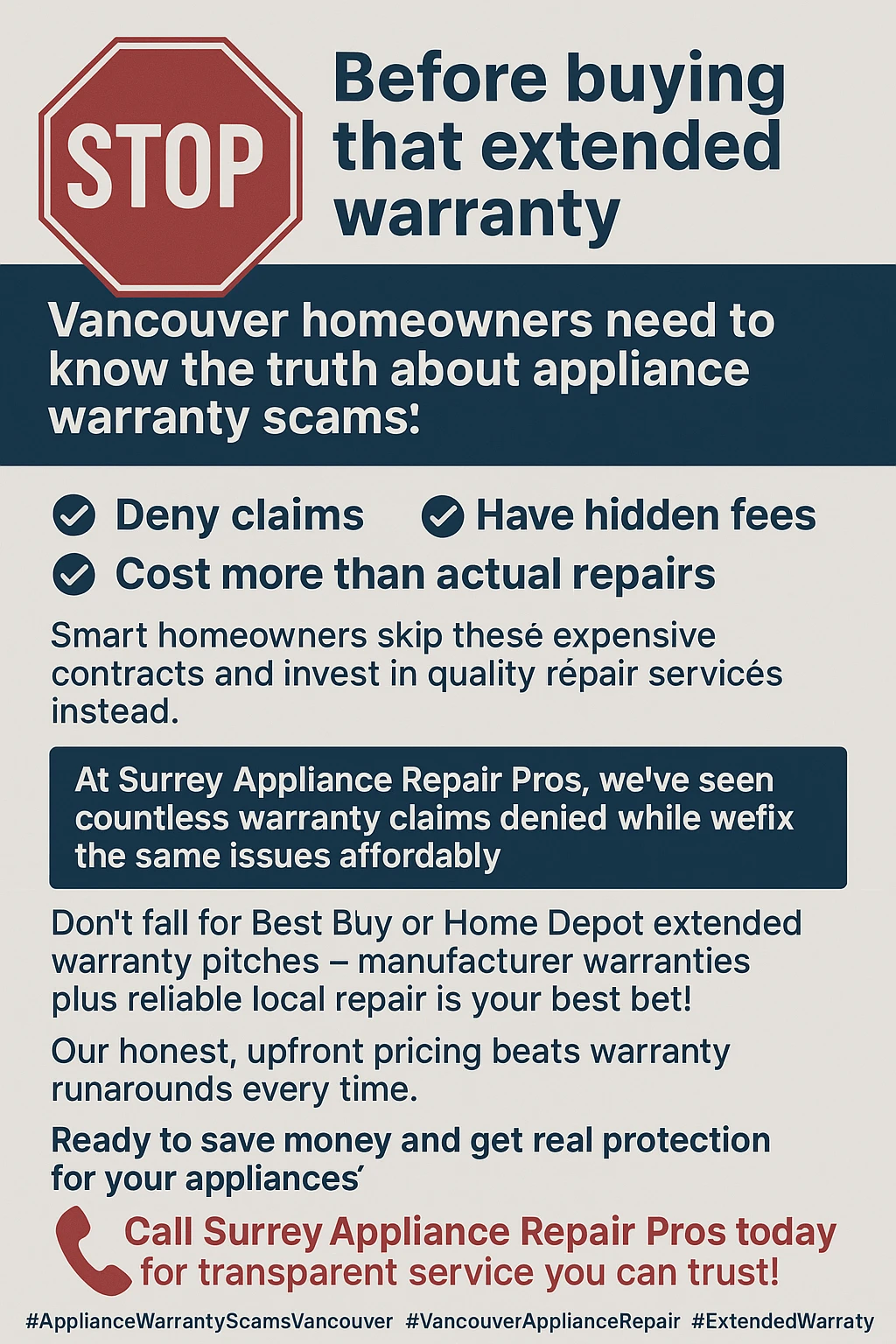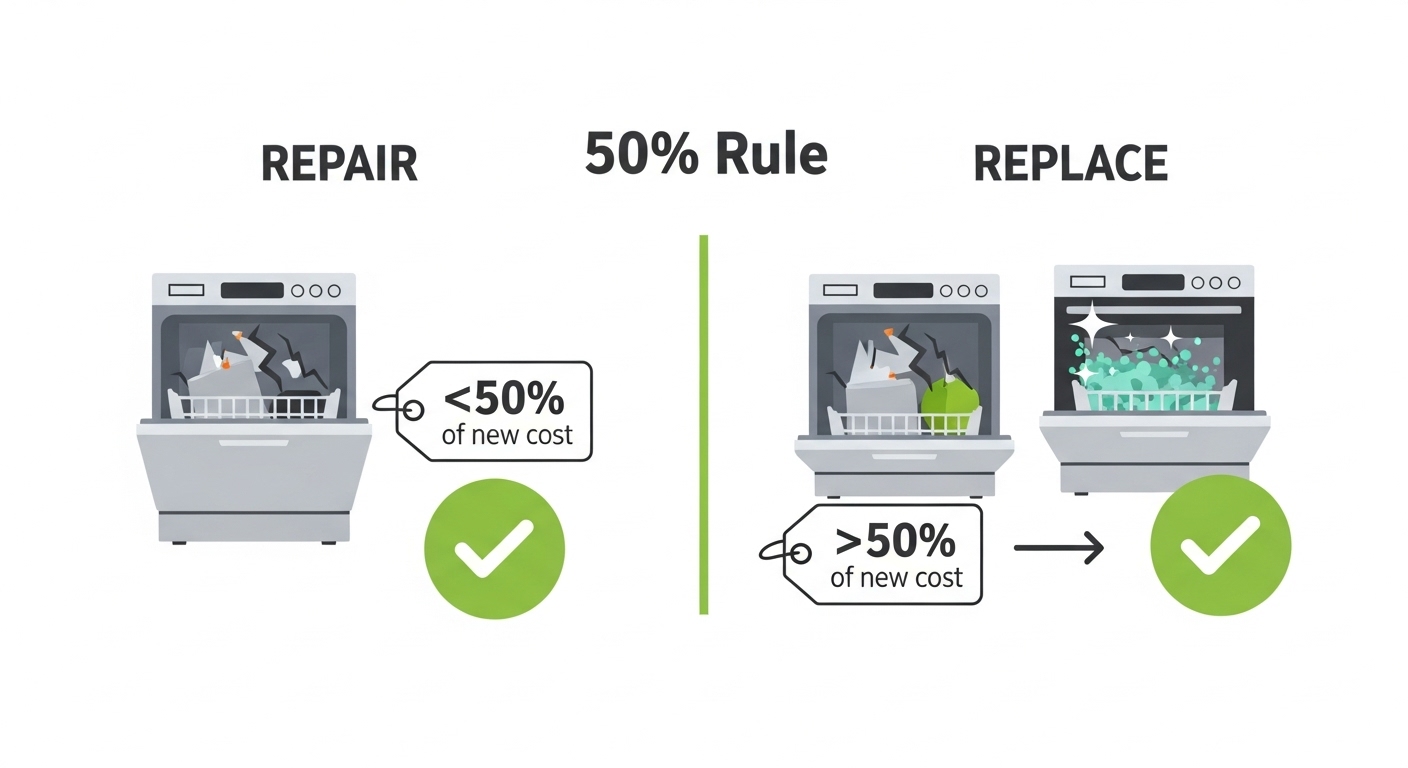Vancouver Appliance Extended Warranty Scam Alert: Why Third-Party Protection Plans Are a Waste of Money (And What Smart Homeowners Do Instead)
Tired of dealing with pushy warranty salespeople calling about your appliances? You’re not alone – Vancouver homeowners are increasingly targeted by sophisticated warranty scams that cost thousands while providing zero protection.Picture this: you’re enjoying a quiet Tuesday evening when your phone rings with a local 604 number. The caller claims to be from your appliance manufacturer, warning that your refrigerator’s warranty expires tomorrow and you need to act immediately to avoid costly repairs. Sound familiar? If you’re a Vancouver homeowner, chances are you’ve received at least one of these calls in the past year. What starts as a seemingly helpful reminder quickly transforms into high-pressure sales tactics designed to separate you from your hard-earned money.  The reality is that Vancouver has become ground zero for increasingly sophisticated appliance warranty scams that prey on legitimate homeowner concerns about expensive appliance repairs. These aren’t your grandmother’s telemarketing calls anymore – modern scammers use artificial intelligence to create convincing fake documents, spoof local phone numbers, and even reference specific details about your home purchase to build credibility. Meanwhile, even legitimate extended warranties sold by major retailers represent terrible financial value, with companies pocketing 50-70% of what you pay while providing minimal actual protection.The good news? Smart Vancouver homeowners are discovering better alternatives that actually protect their wallets while providing real peace of mind. From leveraging manufacturer goodwill programs to utilizing free credit card protections, there are proven strategies that deliver superior results without enriching warranty scammers or overpaying retailers for unnecessary coverage.
The reality is that Vancouver has become ground zero for increasingly sophisticated appliance warranty scams that prey on legitimate homeowner concerns about expensive appliance repairs. These aren’t your grandmother’s telemarketing calls anymore – modern scammers use artificial intelligence to create convincing fake documents, spoof local phone numbers, and even reference specific details about your home purchase to build credibility. Meanwhile, even legitimate extended warranties sold by major retailers represent terrible financial value, with companies pocketing 50-70% of what you pay while providing minimal actual protection.The good news? Smart Vancouver homeowners are discovering better alternatives that actually protect their wallets while providing real peace of mind. From leveraging manufacturer goodwill programs to utilizing free credit card protections, there are proven strategies that deliver superior results without enriching warranty scammers or overpaying retailers for unnecessary coverage.
Key Outtakes:
- Extended warranties cost an average of $126 for major appliances, but actual repair costs average only $152 – meaning you pay nearly as much for the warranty as you’d spend on repairs anyway
- Retailers pocket 50-70% of extended warranty sales as pure profit because they know most customers will never file claims
- One in six homeowners successfully gets manufacturer goodwill repairs completely free, even after warranties expire
- Most major credit cards automatically extend manufacturer warranties by 1-2 years at no cost, making purchased extensions redundant
- Vancouver scammers now use AI technology to create convincing fake warranty documents and spoof legitimate company phone numbers

The Vancouver Warranty Scam Crisis: Why Our City Is Being Targeted
Vancouver homeowners face unique vulnerabilities that sophisticated warranty scammers deliberately exploit. Our city’s expensive housing market creates psychological pressure that fraudsters weaponize – when you’ve invested hundreds of thousands in your home, spending a few hundred on appliance “protection” seems reasonable. But this logic plays directly into scammers’ hands.The problem goes deeper than simple economics. Vancouver’s substantial stock of older homes creates legitimate appliance compatibility concerns that scammers reference with apparent expertise. They’ll mention how your 1960s electrical system might not properly support your new smart refrigerator, or how strata building codes could void manufacturer warranties. These concerns sound credible because they often contain grains of truth, making fake warranty pitches more convincing to unsuspecting homeowners.Our city’s diverse population also creates targeting opportunities. Newcomers to Canada may be unfamiliar with standard warranty practices, business licensing requirements, or telemarketing regulations. Sophisticated scammers deploy multilingual campaigns tailored to specific communities, leveraging cultural context and language familiarity to build trust. The prevalence of strata-governed properties – with over 40% of Metro Vancouver residents living in condos or townhouses – provides another exploitation angle, as scammers reference strata-specific concerns about maintenance responsibilities and compliance issues.Modern warranty scams have evolved far beyond basic telephone fraud. These operations now create professional-looking websites featuring Vancouver addresses, manufactured customer testimonials from supposed local residents, and phone numbers with familiar area codes. When homeowners search for appliance repair services following equipment failures, fraudulent listings appear prominently in search results, sometimes even through paid advertisements. The integration of artificial intelligence represents perhaps the most concerning development, with scammers using AI to create incredibly convincing fake warranties, service agreements, and manufacturer documentation that can withstand casual inspection.  The sophistication extends to caller ID spoofing that makes scam calls appear to come from local Vancouver numbers or even legitimate manufacturer customer service lines. Combined with database access allowing scammers to reference specific appliance brands, purchase dates, and sometimes contractor information, these spoofed calls sound like legitimate follow-ups rather than fraudulent pitches. The Canadian Anti-Fraud Centre has documented cases where scammers reference details with such precision that victims believe calls originate from manufacturer databases.
The sophistication extends to caller ID spoofing that makes scam calls appear to come from local Vancouver numbers or even legitimate manufacturer customer service lines. Combined with database access allowing scammers to reference specific appliance brands, purchase dates, and sometimes contractor information, these spoofed calls sound like legitimate follow-ups rather than fraudulent pitches. The Canadian Anti-Fraud Centre has documented cases where scammers reference details with such precision that victims believe calls originate from manufacturer databases.
Why Extended Warranties Are Mathematical Disasters for Most Homeowners
Even legitimate extended warranties represent objectively poor financial value that becomes clear when examining actual numbers rather than marketing promises. Understanding this reality requires looking at the fundamental economics of how warranty plans operate and what data reveals about their effectiveness.Consumer Reports research reveals the stark mathematical reality: extended warranties cost an average of $126 for large appliances, while the actual cost of repairs averages just $152. This means you’re paying nearly as much for the warranty as you’d spend on repairs anyway, before accounting for service fees, deductibles, and coverage limitations that many plans impose. When you factor in that most appliances don’t require repairs during typical warranty periods, the economics become even more unfavorable.The statistical reality of appliance failure provides crucial context. Based on comprehensive industry data, approximately 17% of gas ranges need repairs within measured periods, with median repair costs of $187. Refrigerators with bottom freezers require repairs 21% of the time at median costs of $216, while side-by-side refrigerators need repairs 31% of the time at $194. For washing machines, the service rate stands at only 5.6%, lower than many other appliance categories. These statistics demonstrate that the probability of needing warranty claims remains relatively low for most appliances, making pre-payment through extended warranties mathematically disadvantageous.Retailers understand these mathematics perfectly, which explains why extended warranty businesses generate extraordinary profitability. According to Consumers’ Checkbook research, stores typically pocket 50 to 70 percent of warranty costs sold – “a profit margin that’s far better than for most products they offer.” This extraordinary margin exists because warranty providers know most customers never use their warranties, yet successfully convince consumers to purchase them anyway. A University of Pennsylvania Wharton School study documented why this dynamic persists: consumers systematically overestimate the likelihood of products breaking when covered by extended warranties.The financial dynamics worsen when examining what extended warranties actually cover versus what they exclude. Coverage frequently contains surprising limitations that restrict usefulness despite comprehensive-sounding marketing language. Extended warranty coverage often excludes accidental damage – despite this being one of the most common reasons appliances require repairs. Plans frequently require use of specific service providers or repair shops, potentially forcing customers to travel to inconvenient locations or ship appliances elsewhere, with shipping costs typically not covered.About one in five consumers who actually use extended warranties report dissatisfaction with repair experiences, with service taking extended time or requiring multiple visits to achieve resolution. There’s also persistent risk that warranty providers themselves will go out of business, leaving policyholders unprotected despite having paid premiums. For Vancouver residents using retailer-specific warranties, programs often transfer responsibility to third-party service networks that may be underfunded, understaffed, or underincentivized to provide quality service.
The 50% Rule and Smart Repair Decision-Making
When Vancouver homeowners face appliance breakdowns, they need practical frameworks for evaluating whether repairs represent wise investments or whether replacement makes more sense. Industry professionals have developed the “50% rule” as a guideline: if repair costs exceed 50% of replacement cost, replacement typically represents the better choice.  This rule incorporates several important factors that Vancouver homeowners should understand. Appliance age serves as perhaps the most critical consideration. Most major appliances have well-documented average lifespans: dishwashers typically last nine years, ranges and stoves operate for 13-15 years, and refrigerators generally function for 13-19 years. Washers typically work for 10-14 years, while dryers last 10-13 years. Understanding where your specific appliance falls within these ranges provides crucial context – appliances exceeding expected lifespans represent poor repair candidates because additional failure probability increases substantially with age.Research examining repair patterns reinforces this principle. A comprehensive European study analyzing approximately 11,000 repair diagnoses found that average service lifetimes of unrepairable appliances reached 12.6 years for washing machines and 12 years for dishwashers. Crucially, this research documented that when failures occurre
This rule incorporates several important factors that Vancouver homeowners should understand. Appliance age serves as perhaps the most critical consideration. Most major appliances have well-documented average lifespans: dishwashers typically last nine years, ranges and stoves operate for 13-15 years, and refrigerators generally function for 13-19 years. Washers typically work for 10-14 years, while dryers last 10-13 years. Understanding where your specific appliance falls within these ranges provides crucial context – appliances exceeding expected lifespans represent poor repair candidates because additional failure probability increases substantially with age.Research examining repair patterns reinforces this principle. A comprehensive European study analyzing approximately 11,000 repair diagnoses found that average service lifetimes of unrepairable appliances reached 12.6 years for washing machines and 12 years for dishwashers. Crucially, this research documented that when failures occurre

